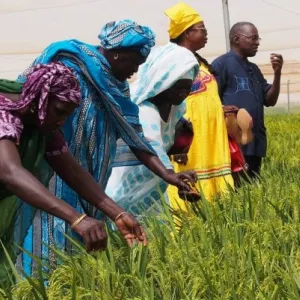Flood-tolerant rice for enhanced production and livelihood of smallholder farmers of Africa
Africa’s average rice yield lags significantly behind Asia, with African farmers harvesting an average of 2.28 tons per hectare (t/ha) compared to Asia’s 4.61 t/ha. This productivity gap is particularly pronounced among small-scale resource-poor farmers who practice rainfed agriculture. Some of the major challenges for rice farmers across Africa are flooding and prolonged dry spells. These challenges have become more frequently pronounced

Flood-tolerant rice for enhanced production and livelihood of smallholder farmers of Africa
Africa’s average rice yield lags significantly behind Asia, with African farmers harvesting an average of 2.28 tons per hectare (t/ha) compared to Asia’s 4.61 t/ha. This productivity gap is particularly pronounced among small-scale resource-poor farmers who practice rainfed agriculture. Some of the major challenges for rice farmers across Africa are flooding and prolonged dry spells. These challenges have become more frequently pronounced as the largest African production areas are located in rainfed environments that suffer from weather variabilities.
Rice serves as a dietary cornerstone for over half of the world’s population. It contributes significantly, accounting for approximately 23% of the daily caloric intake. Asia has historically dominated rice production, with China and India jointly responsible for over 90% of the world’s rice output. Nevertheless, substantial changes have been observed in Africa, driven by shifts in dietary preferences, population growth, and urbanization.
There was a significant surge in rice consumption, from 9.2 metric tons (mt) in 1990 to 31.5 m. in 2019. This rapid consumption growth is beginning to strain production capacities. It has been reported that between 2009 and 2019, Sub-Saharan Africa’s (SSA) average rice consumption stood at 27.4 mt, surpassing the average production of 15.4 mt over the same period.
This persistent deficit between production and consumption has made Africa heavily reliant on rice imports, incurring substantial costs. Over the past five decades, Africa has experienced a notable increase in rice production, primarily attributed to the expansion of cultivated areas rather than substantial improvements in productivity.

